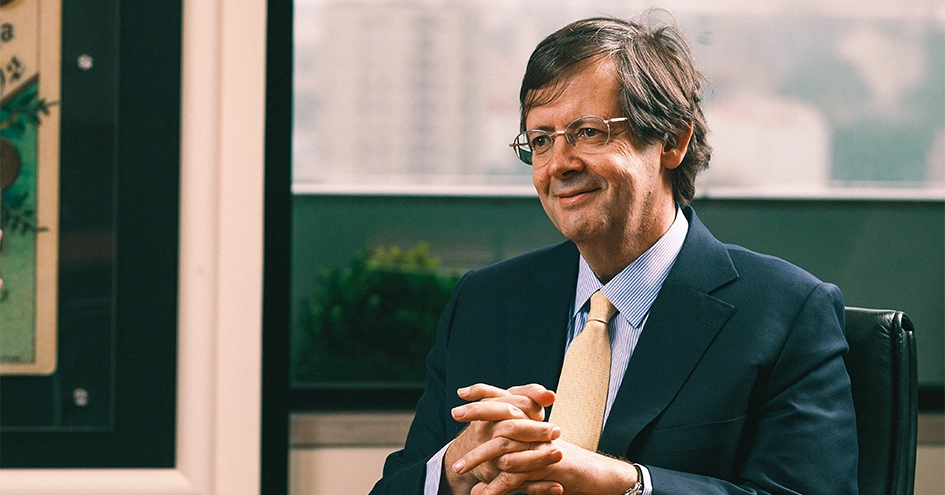
Chairman and CEO of the Jerónimo Martins Group
As a Group with the core mission to provide food products and solutions that are safe, healthy and affordable for everyone while respecting the principles of sustainable development, I am proud that in 2024, even in the face of enormous global challenges, we managed to make true progress on our overarching goal of create meaningful and shared value for all our stakeholders.
Ongoing wars, namely in Ukraine and the Middle East, and political instability marked the year and, as far as we can see right now, will unfortunately continue to do so. As the IMF alerted in its World Economic Outlook published in October 2024, we should all “brace for uncertain times”.
In Europe, where we have more than 90% of our business, both Germany and France are experiencing political and economic crises. For the second year in a row, Germany ended 2024 in recession and France grew only around 1%. When the two major European powers are struggling with low or absent growth, amongst other major concerns, the outlook for the EU cannot be optimistic.
In this challenging context, and despite the concentration of many sources of simultaneous pressure, from food deflation to high cost inflation (namely in labour costs), Jerónimo Martins managed to keep its businesses growing and profitable.
Helped also by positive foreign exchange effects, our global sales grew 9.3% in 2024, reaching 33.5 billion euros (excluding this effect, our sales increased 4.9%) with a global like-for-like of 0.6%.
We were all aware – and we publicly stated it – that the expected rapid drop in food inflation together with the continuous rise in costs, particularly of wages, would lead to an intensified competition for volumes in the markets where we operate. Such a backdrop would require our banners to strengthen their price positioning and to keep investing in their value propositions. This strategy paid off as our banners outperformed their respective markets once again. Reflecting the increased pressure on margins, our consolidated EBITDA margin fell 0.4 percentage points, from 7.1% in 2023 to 6.7% in 2024.
The Group’s EBITDA was negatively impacted by operating costs growing faster than sales, and our net earnings stood at 599 million euros, having decreased 20.8% versus prior year, also affected by the initial endowment of 40 million euros allocated to the Jerónimo Martins Foundation. On a comparable basis, excluding this endowment, net earnings decreased by 15.5%.
Poland saw a remarkable economic recovery in 2024. Wages rose substantially but the increased available income did not translate into more spending. On the contrary, consumers remained very cautious and sensitive to price, and the Polish food sector decreased in volume.
Facing an increasingly fierce competition for volumes, Biedronka pushed hard for sales and recorded an impressive growth of 4.1% in złoty in the year (9.6% in euros). Like-for-like sales declined slightly (-0.3%) due to significant basket deflation. To increase volumes, Biedronka implemented a strong promotional dynamic and, despite investing 0.89 percentage points of its EBITDA margin, was able to secure price leadership in the Polish market, gain share, and post a remarkable return.
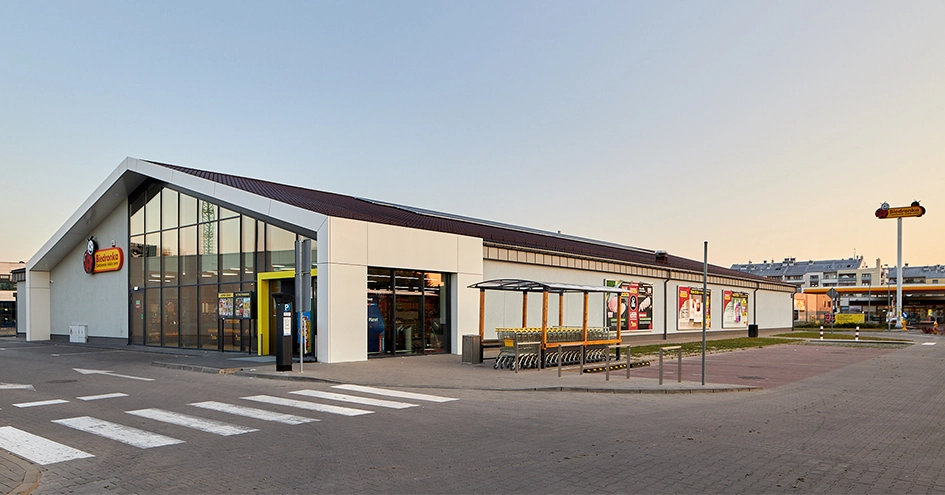
The Company’s expansion continued at a good pace. It refurbished 280 stores and opened 186 new ones (161 net additions), ending 2024 with a network of 3,730 stores. On top of very hard work to deliver one more year of sound results and market share gains, Biedronka’s Polish teams were also dedicated to the build-up of the banner’s operation in Slovakia, supporting our Slovakian team to put together a tailored assortment, an expansion pipeline, scalable logistics, central headquarters and a prepared and engaged organisation. After the local team overcome some administrative and licensing requirements that slightly delayed the initial plan, the first store opening took place on 5 March 2025, the same day the distribution centre was officially inaugurated in Voderady.
In 2024 Hebe achieved solid EBITDA margin progression which grew 1.1 percentage points, thanks to a very efficient cost control strategy and to its business model, with the online channel already accounting for 20% of the banner’s total sales. Hebe’s sales increased 18.1% in złoty (24.3% in euros), with an 8.5% like-for-like growth. The Company kept the selective expansion of its brick-and-mortar presence in Poland, with 33 net additions, and also in the Czech Republic (opening a new store in 2024, ending the period with three stores in Prague) and in Slovakia, with one store in Bratislava and another one in Prešov.
The Portuguese economy had a sluggish year in 2024. Economic activity was weaker than in 2023, despite low unemployment rates, the fall in inflation, lower interest rates and the inflow of European funds. Portuguese consumers are the most pessimistic of the main countries in which we operate and remained highly sensitive to price opportunities and promotions.
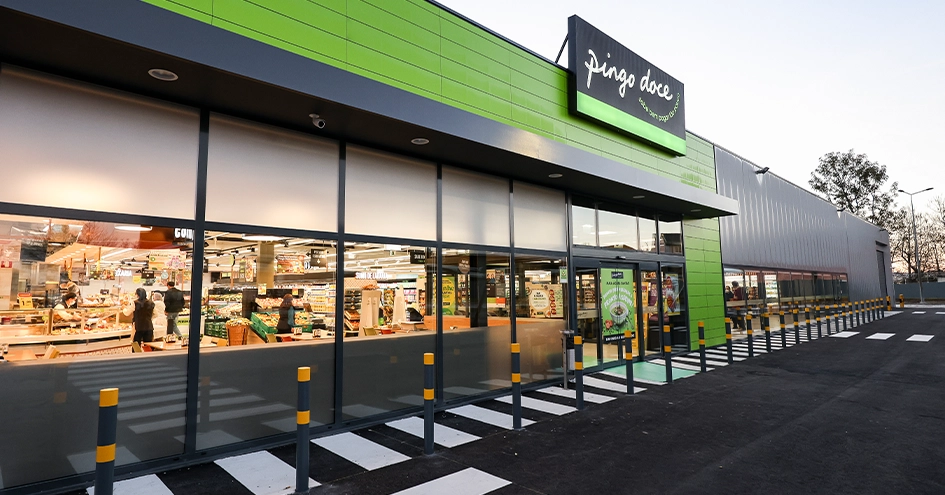
Like Biedronka but on a lesser scale, Pingo Doce also experienced basket deflation but this was more than offset by solid volume growth. Sales grew 4.5%, surpassing for the first time the 5-billion-euro milestone (including fuel) and like-for-like sales (excluding fuel) were up 4%. These figures show that the Company’s track-record and competitive advantages in meal solutions and the roll-out of the new store concept are clear boosters. In 2024, 64 stores were refurbished and 10 were opened (7 net openings). In the last two years, around 25% of Pingo Doce’s network has been converted to the All About Food concept, which devotes more space and visibility to ready meal solutions. “Comida Fresca” is already the largest restaurant network in Portugal.
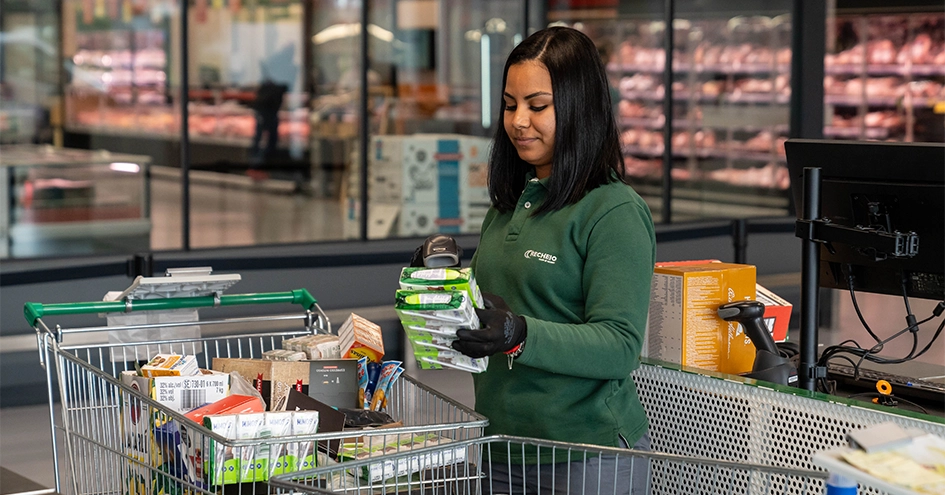
Recheio had a difficult year, having to cope with a weak out-of-home consumption, which affected the HoReCa channel, particularly restaurants. Recheio’s sales grew 1.9%, like-for-like 2.1% and EBITDA margin fell 0.3 percentage points, to 5.1%. Nevertheless, the Company grew clients in every segment and the Amanhecer network ended the year with more than 700 locations.
Also in Portugal, and in the year in which it celebrated its 10th anniversary, our agribusiness kept growing its production capacity in all areas and broadening its investments, paving the way to becoming a more and more relevant player.
In Colombia, the macroeconomic scenario shows some improvement compared to the previous two years, but families continued to face severe financial difficulties. Food retail volumes did not grow in the year and there was a clear trading-down trend. Despite this very challenging context, Ara remained fully committed to democratising access to food, and sales grew 11.1% in Colombian pesos (17% in euros) and 0.2% on a like-for-like basis. The EBITDA margin increased 1.5 p.p., bringing the Company to positive EBITDA on a pre-IFRS16 basis.
I am particularly happy that we were able to launch a meaningful social initiative in Colombia, the “1 Million Reasons” programme, within the scope of which we invested one million euros to support, together with NGOs and charities on the ground, the most vulnerable communities, especially children and mothers. We estimate to have reached 60,000 people by the end of 2024 through the several projects, namely with the creation of the first food bank in the Pacific region.
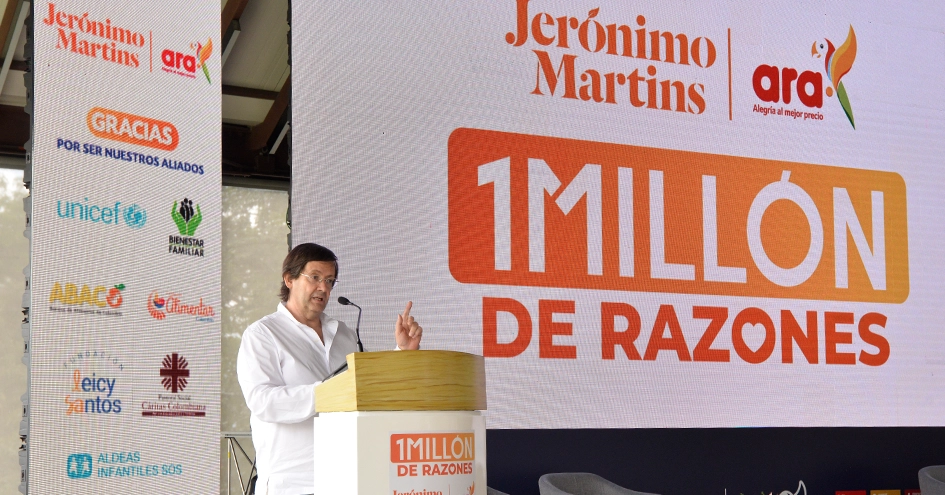
Our commitment to social sustainability is deeply rooted in the Group, as evidenced by the Biedronka Foundation’s activities and also the creation of the Jerónimo Martins Foundation. Globally, the Group allocated more than 80 million euros to support local communities (not including the initial endowment to the Jerónimo Martins Foundation).
As an employer, we are becoming increasingly multicultural. We have 87 different nationalities within the Group and were included in the FTSE Diversity & Inclusion Index, which recognises the Top 100 companies in the world that better qualify as inclusive workplaces.
In terms of our environmental performance, I want to highlight the approval by the Science-Based Targets Initiative (SBTi) of our near and long-term targets to reach carbon neutrality by 2050. By year-end, we had more than 2,000 stores and distribution centres with photovoltaic cells. And for the fourth year in a row, Jerónimo Martins is an A-list company in the annual CDP Climate assessment and reached Leadership level in what concerns managing water as a critical resource and fighting deforestation.
Of particular note is our Sustainable Finance Framework, implemented last year and which links the cost of financial instruments to our sustainability performance. By the end of 2024, around 25% of our financial debt was already converted to sustainable finance instruments and Jerónimo Martins was included in over 140 international sustainability indices.
This annual report is the first in which we disclose our sustainability policies, practices and performance according to the new (and heavy) ESG reporting requirements, replacing our fifteen-year-old five-pillar corporate responsibility structure. As we do our best to cope with the regulatory burden and the high complexity associated with it, I hope that the authenticity of the spirit and the sense of purpose that has guided our teams and businesses in our sustainability journey find their way to keep alive and pulsing.
I would like to take this opportunity to thank all our teams for their valuable contribution to the Group’s performance. Their commitment and dedication have been instrumental in achieving the results presented in this report, and that is why our investment in recognition measures grew 13% to more than 350 million euros.
I also want to show deep appreciation for the trust that Jerónimo Martins’ shareholders, including the family I represent, have placed in the management teams under my leadership. Finally, I would like to thank those who work closely with me on the Group’s Managing Committee and on the Board of Directors that is now completing its three-year mandate.
It is an honour to serve alongside all of you for a better and more responsible business every day.
Pedro Soares dos Santos
Chairman and CEO of the Jerónimo Martins Group
